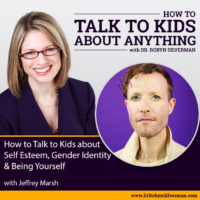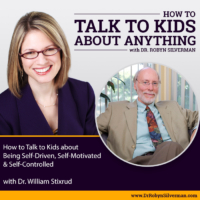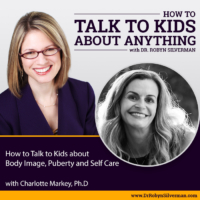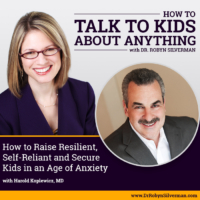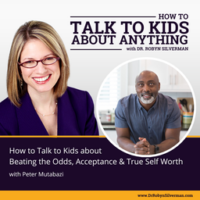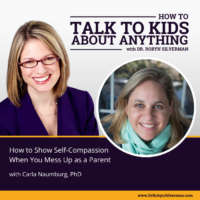Podcast: Play in new window | Download
Subscribe: Apple Podcasts | RSS | More
How to Talk to Kids about Self-Awareness, Identity, Gender and Diversity
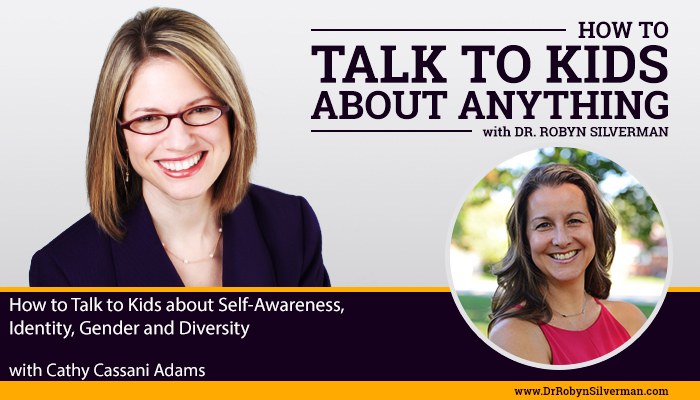
This podcast will focus on how we can stay curious about ourselves and ensure that we are growing and learning so that we can encourage our children to do the same. There are many areas of life that are being questioned and evolving right now- from questions about race, gender, sex and identity. How can we engage in conversations with our kids about these topics that engages curiosity instead of fear? Dr. Robyn Silverman interviews Cathy Cassani Adams for answers and insight.
Special guest: Cathy Cassani Adams
What is Zen Parenting? Zen, according to Cathy Cassani Adams is about showing up for every aspect of life, to do our best to be self aware, attentive and evolving- always seeking to gain a deeper understanding of ourselves and others by accepting who we are and showing up in this world authentically and ready to learn. By doing this as parents, we give our children permission to do the same. As people all here for the same reason- understanding how best we can talk to our children about anything—all the things that matter—we can apply this philosophy to our conversations from identity to inequality, race to sexuality, gender and mental health. This, again, all takes self-awareness and the process of unlearning some lessons that we may have regarded as truth at one point but that either we are now learning to be untrue or that it’s power over us no longer serves us—if it ever did. For a discussion of zen parenting and how it interacts with how to talk to kids, we are turning to Cathy Cassani Adams.
Bio
Cathy Cassani Adams, LCSW, co-hosts the Zen Parenting Radio podcast and is author of Zen Parenting: Caring for Ourselves and Our Children in an Unpredictable World (Hachette, 2/22) and Living What You Want Your Kids to Learn: The Power of Self-Aware Parenting (2014) which won which won a Nautilus Award, National Indie Excellence Award, and an International Book Award. She is a clinical social worker, certified parent coach, former elementary school educator, and yoga teacher. Cathy teaches in the Sociology/Criminology Department at Dominican University, and she lives outside of Chicago with her husband Todd and their three daughters.
Important Messages:
- We react to children talking back- may be related to unresolved pain. Kids have a different view. Important topics- screen time, social justice, sexuality. Remember- kids are supposed to have a different perception. Not trying to teach kids to be like us and live in “our generation” but rather prepare them to live in their generation. They came in as a certain person- of course can be learn- but very different people. Our goal as parents and educators is to help them become who they are. What that means is that they may have viewpoints that might be different than ours. We need to listen to them- how do they see the world? Learn so much from kids. Engage in their experiences and their world- then opens up our viewpoints. It’s a back and forth. Don’t want to be offended by this- but rather, encourage the development of viewpoint.
- What if you are trying to connect with a child? Are we shutting them out when we say they are talking back? Are we listening to their viewpoint? Need self awareness. Why are we saying what we are saying? Why do certain things offend us?
- If we are approaching a conversation with all of our baggage- why are you saying this to me? Why are you thinking this way? Why aren’t you seeing this my way? The kids may not be able to articulate the issue but they can feel it. That can stifle the conversation. They feel the heaviness. Kids may then worry. If we can arrive a conversation with laying down our weapons, ability to hear anything even if it’s not what we want to hear, without thinking you are being attacked- it makes all the difference. That’s when the person feels validated and feel like you get it. Hear it, be present. That’s where intimacy happens- that’s trust- that’s connection!
- Inequality: You quote the book “So you want to talk about race” that tells us “you have to get over the fear of facing the worst of yourself. You should instead fear unexamined racism…do not fear the opportunity to do better.” You point out that groups that experience oppression don’t have the luxury of just not talking about inequality. Main messages that we should be discussing when it comes to inequality: (1) We need to notice the differences. Not just the differences on the outside- the skin, the hair, culture, wear, but also what opportunities people have. The history that has brought people to wear they are. The noticing is the key to compassion & own self understanding. (2) Privilege: Sometimes we feel guilty, bad, shouldn’t have what we have. Privilege. Like it’s a negative. But it’s not a negative- it’s how you use it. If you have privilege, how do you choose to use it? Socio-economic. Marriage. Parenting- more typical. (Same sex parents might need help). If you have privilege, what do you speak up for? How do you recognize that everybody everywhere wants the same things- to be connected, to be loved, to belong, to be seen (very human needs across the board), and that this fear we have of each other- of someone who doesn’t look like you, have the same desires as you, job difference is somehow completely different from you. (3) Don’t just say we are all the same. We aren’t. But in some ways- we are.
- Bryan Stevenson. Proximity. Recognize- we are all having same internal experience. Proximity to bring us all together. Have dignity. Integrity. Offering dignity to others.
- (4) Get proximal. Read books- point it out. Let’s talk about the news. Center diversity in TV, movies, books, toys. People who are experiencing people’s everyday experience- the joy too. It’s not just oppression. It’s joy and pain. Need to talk about how we are the same and different. The news is a great way to maintain conversations.
- (5) Use a curiosity lens: What’s going on in the world? Ask them; what are you hearing? What do you think? How do you see that? If off on it—give input. They have a lot of information. Their hearts are very open! They tend to be the best teachers.
- Sex education: If you are not offering information, your kids are going to get it from their peers and their peers don’t know what they are talking about! If you wait, then they often think they know more than you! Sexuality is not just about sexual intercourse- it’s about relationships, how we feel about our bodies, our developing bodies. Self awareness, relate with body, have the information. How our body works. What kinds of relationships do we want? How do we feel respected? This all falls into how we can have a healthy relationship. What is it that you want your kids to know about sex? Parents say they haven’t even thought about it yet. If we are unsure about what we want to teach then we won’t know what to relay! The message gets muddied. We need to be able to share our hopes for them.
- Bonnie Rough: Sex is a normal part of being a human being. We are born sexual beings. Not avoid it and just think- “my kids isn’t going to be sexual!” What do you want for them? We want them to have a healthy sex life eventually. We want them to relate to themselves in a self-appreciating not self-depreciating way. You want to be prepared.
- If not prepared. “That question is amazing. I want to offer a helpful and thoughtful response so let’s talk about it tonight.”
- What is your history? A lot of people have sexual trauma. “Nobody talked to me about sex- and I came out fine!” But now asking for help. Live in the discomfort- dividends come from these conversations.
- Research: Children who grow up in a home where sex is discussed openly, are more likely to wait to become sexually active.
- Sex talk—does it hurt? How feel about ourselves, our partner, why we are doing it. Answer honestly. Don’t gloss over. Like how we don’t gloss over race “everyone is the same!” Need to talk about the nuances. We have to get in the way of the information. Not be educated by porn. Can’t be there for every moment. Want to talk about porn. Fantasy of most often by men. Upping the ante. Violent. Misogyny. Euphoria. Talk about porn elements. Incorporated into the sex they are having. What do you think about that? Is that what you believe sex to be? Or countering. No, that’s not what connected sex is.
- Gender: Widely uncomfortable. Nuanced. Pronouns. Gender considered. Spectrum of LGBTQ. What do we need to consider when we are talking about gender? Not just pushing it off. Meeting kids where they are. Embracing who they are instead of who we expect them to be. Like race, not a way to have these conversations without them getting messy. Open heart. Willingness to get it right. Mistakes not because want to harm- but tryung to learn and get things right. Things are changing fast. What’s actually happening is that it’s opening. The language is opening. Gender is opening. Applies to everyone. Some adults are only finding themselves now. What’s most current when it comes to language and legislature? Baseline understanding. How do you use pronouns? Baseline knowledge. Discussions with kids. Openness with kids. It’s a non-thing for kids these days.
- Offended? Too hard? Is that what we would say to our kids when they are learning? Always in studentship. This is our opportunity to expand! To evolve! You can’t shut this down. Kids and adults- they’ve felt disquieted, misunderstood and now feel embraced or comfortable or seen!
- “There are children and adults who have lived in a way where they have felt ashamed, quieted, unloved, displaced, or misunderstood. And now there is this opening for them where they can live in a place of alignment and connection and authenticity- and why would we not want someone to have that?”
- “If you don’t get the lesson, it shows up wearing another pair of pants” – Oprah Winfrey
- Where to start? Go to the people who know best. (1) People living it: Youth outlook- offer information, statistics with regard to LGBTQ community. Human Rights Campaign. People with the lived experience. Transgender- Laverne Cox (podcast with Brene Brown), listed to lived experience. The offerings. Perspective of person who is living it. How can we disseminate the word once we learn it? Eliot Page- transgender- talking about it. Jessica Herthel- I am Jazz- with Jazz Jennings. When my kids met someone who is transgender- “oh that person is like Jazz.” Start early! Great books out there- piggyback conversation. Jazz- started so young being an advocate. Have to respect that! Knowing it’s new and there’s backlash- she did it anyway. Self trust. Evolved to this point. We were all the bridge to this experience.
- Bryan Stevens- proximity. Kids exposed to LGBTQ. Grown up with kids since young- deep acceptance that comes when we are exposed to something when we are young. Like language. It just becomes part of us or what we accept to be true and right.
- How do we define ourselves? How do we identify? Hero’s journey. Exercise. How might you use it to help them disrupt a negative definition of who they are? Illuminate a more positive concept of self. Hero’s journey. Love it- Acceptance of things that will go wrong. Not a linear journey! More like a roller coaster or like waves. Kids are going to have tough times. Pain. Failure. Not job to keep that from happening. Our job to show up and validate and listen. To be there for their crisis. Let them have the struggle. Hero’s journey- takes pain. Disappointment. Challenge. To get us to be who we are meant to be. Deeper human. Here are the struggles- here are the people who got me through it- and now I am in a different place in my life. We can’t launch our kids on a hero’s journey because we want to. We need to ask, are these the beliefs about yourself- where did they start? How does it feel in your body when you think that? Can’t 100% relate but can talk about our experiences if they apply. Not living parallel lives. Feeling states. A sense of connection if not advice. Not the only one. Other ways through this. Trusting. The messy things- catapult them to the next level of understanding.
- Retroactively- highlight hero’s journey to see a person’s identity. Not a false story. The real thing- a picture- you did this, your did that, this was hard…and then you asked for help. How did they grow? How it brought them to another plane. Need our kids need to be in the story telling with us. We give it to them as a tool. We’ve done this type of journey before. A little bit of a path through this forest. Hope.
Top tip: Stay curious. Be curious about yourself. Walk through your beliefs and history. Not a blame game. Who am I? Why do I make these choices? In alignment with ourselves. Extend to our kids. Then allow kids to be curious about their lives. Makes more connection
Notable Quotables:
- “Soft skills are THE skills we need to survive and relate.”
- “Our goal as parents and educators is to help our kids become who they are.”
- “As we listen to our kids and how they see their world, it opens up our viewpoints so we see and experience things differently. It’s a back and forth.”
- “If we can arrive a conversation with putting down our weapons, being vulnerable and with the ability to hear anything even if it’s not what we want to hear, without thinking you are being attacked but instead hearing the experience of this child you care for who is in front of you- it makes all the difference. That’s when the person feels validated and feels like you get it. Even if you’ve never had their experience- you are willing to hear it and be present for it. That’s where intimacy happens- that’s where connection happens- that’s what trust is!”
- “Noticing is the key to compassion. It’s also the key to our own self understanding.”
- “If you have privilege, what do you speak up for?”
- “If you have privilege, what do you speak up for? How do you recognize that everybody everywhere wants the same things- to be connected, to be loved, to belong, to be seen, and that this fear we have of each other- of someone who doesn’t look like you, have the same desires as you, job difference is somehow completely different from you.”
- Sex education: “If you are not offering information, your kids are going to get it from their peers and their peers don’t know what they are talking about!”
- “What is it that you want your kids to know about sex? If we don’t know what we want to teach then our message will obviously not be relayed.”
- “Sex is a normal part of being a human being. We are born sexual beings. What do we want for them when they become adults? We want them to have a healthy sex life eventually. We want them to relate to themselves in a self-appreciating not self-depreciating way.
- “When it comes to gender, it’s changing and its opening. It’s becoming less rigid in its structure and becoming more available to everyone.”
- “There are children and adults who have lived in a way where they have felt ashamed, quieted, unloved, displaced or misunderstood. And now there is this opening for them where they can live in a place of alignment and connection and authenticity- and why would we not want someone to have that?”
- “What I love about the Hero’s Journey is the acceptance that things will go wrong.”
Soft skills are THE skills we need to survive and relate. Let’s teach them to our kids! I interview @selfawareparent @Zenparenting on this week’s #TalktoKids podcast and we discuss how parents AND kids can become self-aware & open.
Click To Tweet
Resources:
Social Media for Dr. Robyn:
- facebook.com/DrRobynSilverman
- twitter.com/DrRobyn
- instagram.com/DrRobynSilverman
- facebook.com/HowToTalkToKidsaboutAnything
The post How to Talk to Kids about Self-Awareness, Identity, Gender and Diversity with Cathy Cassani Adams appeared first on drrobynsilverman.com.

